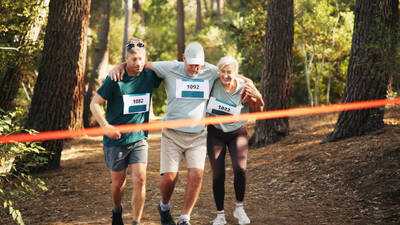As you age, your brain tends to slow down. This makes simple everyday tasks, such as problem-solving, focus, and memory, a challenge. So, can you prevent cognitive decline? Or slow it down? Well, according to science, yes, it's possible. You can slow down cognitive decline. No, you don’t have to spend on expensive supplements or treatments to achieve it. In fact, it requires almost no money at all. A new study has found that a simple daily act can slow down cognitive decline.
A new study led by the researchers at the University of Texas at Austin and the University of Massachusetts Boston has found that cognitive decline can be reduced by about 20% by a simple act of kindness. The findings of the study are published in the journal Social Science & Medicine.
Helping others can reduce the rate of cognitive decline

The latest evidence shows that meaningful social connections improve health. The researchers found that helping others outside the home regularly can significantly slow cognitive decline in middle-aged and older adults. They noticed that regular volunteering can reduce the rate of cognitive aging by 15-20%.
The study involved more than 30,000 adults from the US over two decades. They found that the cognitive decline linked with aging dropped by 15-20% in people who formally volunteer their services or help in more informal ways with neighbors, family, or friends outside the home regularly.
They noticed an improved cognitive function in those who set aside about two to four hours per week to helping others.
“Everyday acts of support, whether organized or personal, can have lasting cognitive impact. What stood out to me was that the cognitive benefits of helping others weren’t just short-term boosts but cumulative over time with sustained engagement, and these benefits were evident for both formal volunteering and informal helping. And in addition to that, moderate engagement of just two to four hours was consistently linked to robust benefits,” Sae Hwang Han, an assistant professor of human development and family sciences at UT, who led the study, said in a statement.
Helping rewards the brain

Any act of helping or volunteering in either formal or informal ways, such as assisting neighbors, relatives, or friends in need with things like getting to a health appointment, caring for children, lawn work, or preparing taxes, is associated with improved cognition.
“Informal helping is sometimes assumed to offer fewer health benefits due to its lack of social recognition. It was a pleasant surprise to find that it provides cognitive benefits comparable to formal volunteering,” Han said.
The researchers also found that people who make helping behaviors a part of their routine, year over year, have greater benefits.
Video
“Conversely, our data show that completely withdrawing from helping is associated with worse cognitive function. This suggests the importance of keeping older adults engaged in some form of helping for as long as possible, with appropriate supports and accommodations in place,” Han said.

This study further emphasizes the need to discuss volunteerism, helping, and strengthening neighborhood relations, particularly in later life when diseases associated with cognitive decline and impairment, like Alzheimer’s, tend to set in.
Another study led by Han also found that volunteering buffered the adverse effects of chronic stress on systemic inflammation, a known biological pathway linked to cognitive decline and dementia. The effect was especially pronounced among people with higher levels of inflammation.
“Many older adults in suboptimal health often continue to make valuable contributions to those around them, and they also may be the ones to especially benefit from being provided with opportunities to help,” Han said.
A new study led by the researchers at the University of Texas at Austin and the University of Massachusetts Boston has found that cognitive decline can be reduced by about 20% by a simple act of kindness. The findings of the study are published in the journal Social Science & Medicine.
Helping others can reduce the rate of cognitive decline
The latest evidence shows that meaningful social connections improve health. The researchers found that helping others outside the home regularly can significantly slow cognitive decline in middle-aged and older adults. They noticed that regular volunteering can reduce the rate of cognitive aging by 15-20%.
The study involved more than 30,000 adults from the US over two decades. They found that the cognitive decline linked with aging dropped by 15-20% in people who formally volunteer their services or help in more informal ways with neighbors, family, or friends outside the home regularly.
They noticed an improved cognitive function in those who set aside about two to four hours per week to helping others.
“Everyday acts of support, whether organized or personal, can have lasting cognitive impact. What stood out to me was that the cognitive benefits of helping others weren’t just short-term boosts but cumulative over time with sustained engagement, and these benefits were evident for both formal volunteering and informal helping. And in addition to that, moderate engagement of just two to four hours was consistently linked to robust benefits,” Sae Hwang Han, an assistant professor of human development and family sciences at UT, who led the study, said in a statement.
Helping rewards the brain

Any act of helping or volunteering in either formal or informal ways, such as assisting neighbors, relatives, or friends in need with things like getting to a health appointment, caring for children, lawn work, or preparing taxes, is associated with improved cognition.
“Informal helping is sometimes assumed to offer fewer health benefits due to its lack of social recognition. It was a pleasant surprise to find that it provides cognitive benefits comparable to formal volunteering,” Han said.
The researchers also found that people who make helping behaviors a part of their routine, year over year, have greater benefits.
Video
“Conversely, our data show that completely withdrawing from helping is associated with worse cognitive function. This suggests the importance of keeping older adults engaged in some form of helping for as long as possible, with appropriate supports and accommodations in place,” Han said.
This study further emphasizes the need to discuss volunteerism, helping, and strengthening neighborhood relations, particularly in later life when diseases associated with cognitive decline and impairment, like Alzheimer’s, tend to set in.
Another study led by Han also found that volunteering buffered the adverse effects of chronic stress on systemic inflammation, a known biological pathway linked to cognitive decline and dementia. The effect was especially pronounced among people with higher levels of inflammation.
“Many older adults in suboptimal health often continue to make valuable contributions to those around them, and they also may be the ones to especially benefit from being provided with opportunities to help,” Han said.
You may also like

Putin thanks Trump for 'atmosphere of trust' at Alaska meeting

They Also Fought So That We Could Proudly Hoist The Tricolour

'Astonishing' WWI film leaves viewers 'totally enthralled' as it shares untold story

Coronation Street fans 'confused' as show legend's real name unveiled by co-star

Tesco own brand coffee half the price of market leader that tastes 'three times' better






